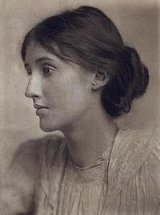
literary figures of the twentieth century.
During the interwar period
, Woolf was a significant figure in London literary society and a member of the Bloomsbury Group
. Her most famous works include the novels Mrs Dalloway
(1925), To the Lighthouse
(1927) and Orlando
(1928), and the book-length essay A Room of One's Own
(1929), with its famous dictum, "A woman must have money and a room of her own if she is to write fiction."
Virginia Woolf was born Adeline Virginia Stephen in London in 1882 to Sir Leslie Stephen
and Julia Prinsep Stephen (née Jackson).
Virginia's father, Sir Leslie Stephen (1832–1904), was a notable historian, author, critic and mountaineer.
The strange thing about life is that though the nature of it must have been apparent to every one for hundreds of years, no one has left any adequate account of it. The streets of London have their map; but our passions are uncharted. What are you going to meet if you turn this corner?![]()
But can we go to posterity with a sheaf of loose pages, or ask the readers of those days, with the whole of literature before them, to sift our enormous rubbish heaps for our tiny pearls? Such are the questions which the critics might lawfully put to their companions at table, the novelists and poets. ![]()
Life is not a series of gig lamps symmetrically arranged; life is a luminous halo, a semi-transparent envelope surrounding us from the beginning of consciousness to the end.![]()
Theirs, too, is the word-coining genius, as if thought plunged into a sea of words and came up dripping.![]()
But delightful though it is to indulge in righteous indignation, it is misplaced if we agree with the lady's-maid that high birth is a form of congenital insanity, that the sufferer merely inherits the diseases of his ancestors, and endures them, for the most part very stoically, in one of those comfortably padded lunatic asylums which are known, euphemistically, as the stately homes of England.![]()
It was enemies one wanted, not friends.
![]()
A light here required a shadow there.![]()

